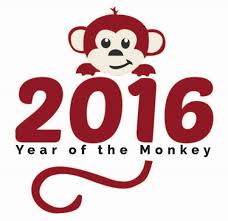
The new Chinese year arrived Monday, and its one to go bananas over. On Feb. 8, the zodiac calendar entered the Year of the Monkey — the ninth of 12 animal signs.
Having a baby in the Year of the Monkey is generally thought to be more auspicious than in that of its predecessor, the sheep, and the cute creature is in any case largely beloved by the masses for its playful and human-like characteristics, despite a penchant for stealing food.
The new lunar year is already boosting a fighting style that imitates the movements of a monkey. It also offers an excuse to cash in on China's most famous monkey — Sun Wukong, or the Monkey King — a fabled demon-slayer.
Those born in the Year of the Monkey are held to be playful, mischievous and clever — much like a monkey.
"Many people say people born in the Year of the Monkey are smart and have a very good imagination, but it is thought that their chances of achieving success are not very good as they are less capable of executing things," said Beijing resident Wang Jinping, whose zodiac sign is the monkey.